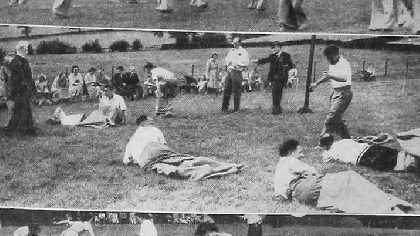
It was all action in Old Glossop as the social club at Hawkshead Mill held what was to be the firm’s first annual sports day.
According to the Chronicle more than 300 people turned out on a hot July day in 1950 to take part or just sit in the sun and spectate.
Isaac Jackson and Sons was one of Glossop’s biggest employers, although locally most knew the company that made fasteners as Hawkshead.
Sadly the firm would eventually close, the land it occupied now mostly covered by homes, but it was once well known nationally and internationally.
That sports day 75 years ago featured the usual fun events for employees and their families, although competition was competitive.
There were races over 50 and 100 yards, three-legged races, wheelbarrow races and carrying potatoes in spoons. There was even a shoe race!
A Gamesley man who was the boss of a League of Ireland football club was back home looking to recruit new players.
Sligo Rovers player manager Tommy Wright, of 39 Glossop Road, was hoping to sign a centre-half and a full-back and was asking anyone interested in crossing the Irish Sea with him to get in touch.
Football would shortly be taking over from cricket on the Chronicle sports pages but before then Glossop’s two top clubs were meeting for an intriguing game on the ground they shared at North Road.
Glossop FC and Glossop CC had arranged a fund-raising cricket match and not surprisingly it was the Lancashire and Cheshire Cricket League lads who declared on 160 for six and won, bowling the Manchester League footballers out for 108.
It was back to league business for Glossop CC 24 hours later and the North Road side were anticipating an easy victory after totalling 179 and having visitors Stand at 120 for nine with the last pair at the wicket.
There was 25 minutes left, but the tail enders did their job and were still there at the close with the Cheshire side on 120. It was no doubt a huge disappointment for Glossop bowler G. Turner who had a five-wicket haul.
Hadfield St. Andrews had opened up a five-point lead at the top of the Glossop and District Cricket League first division and seemed certain of taking the title.
Old Glossop were determined to halt the winning run, and they did, bowling the church side out for 75 with J. Winterbottom finishing with seven wickets for 17 and cruising to a match wining 78 for five.
Hadfield St. Charles made it nine wins on the run at the top of the Glossop Sunday School League, declaring at 65 for two and bowling out Glossop St. Mary’s for 40.
Other results: Mount Pleasant 88, Padfield 47; Tabernacle 55, Shrewsbury Street 24.
Charlesworth councillors were complaining that the campaign to get a railway ‘Halt’ at Gamesley, which had been going on for more than 50 years, had again been turned down, rejected by the ‘railway authorities’ despite pressure from the town council and MPs.
Seventy-five-years later, the wait continues.
Nineteen-year-old Eileen Annie Knowles of Woolley Lane, Hollingworth, was making the long journey to New Zealand to start a new life with her husband to be, Sydney Weaver.
They were hoping to travel together, but 20-year-old Sydney’s emigration papers had not arrived, and it would be three months before he could join Eileen who would be living with his parents in Auckland.
A young Glossop girl had a narrow escape when she ran after a ball she was playing with on the pavement outside her home on High Street East, Glossop, which bounced into the road.
May Beckwith, six, was hit by a car suffering bruising to her head, legs and arms, but luckily did not require hospital treatment.
New housing developments at Whitfield Avenue were being praised by the town council who said they had created a hamlet to be proud of.
So many families lived there that there was increasing pressure to divert the bus service along the avenue.
Fourteen-year-old Joslane Flevet was visiting Glossop with a party of pupils from France on a school exchange visit.
She spent the weekend with a Mrs Cuthbert at her home Sunlaws Street home, stating Glossop was “a wonderful place”.
John Broadbent, 67, was back visiting his sister Harriet in Post Street, Padfield, for the first-time in 40 years since leaving the village to seek his fortune in America.
He settled in Minnesota, playing piano in cinemas, before joining a 30-piece orchestra on Cunard liners.




